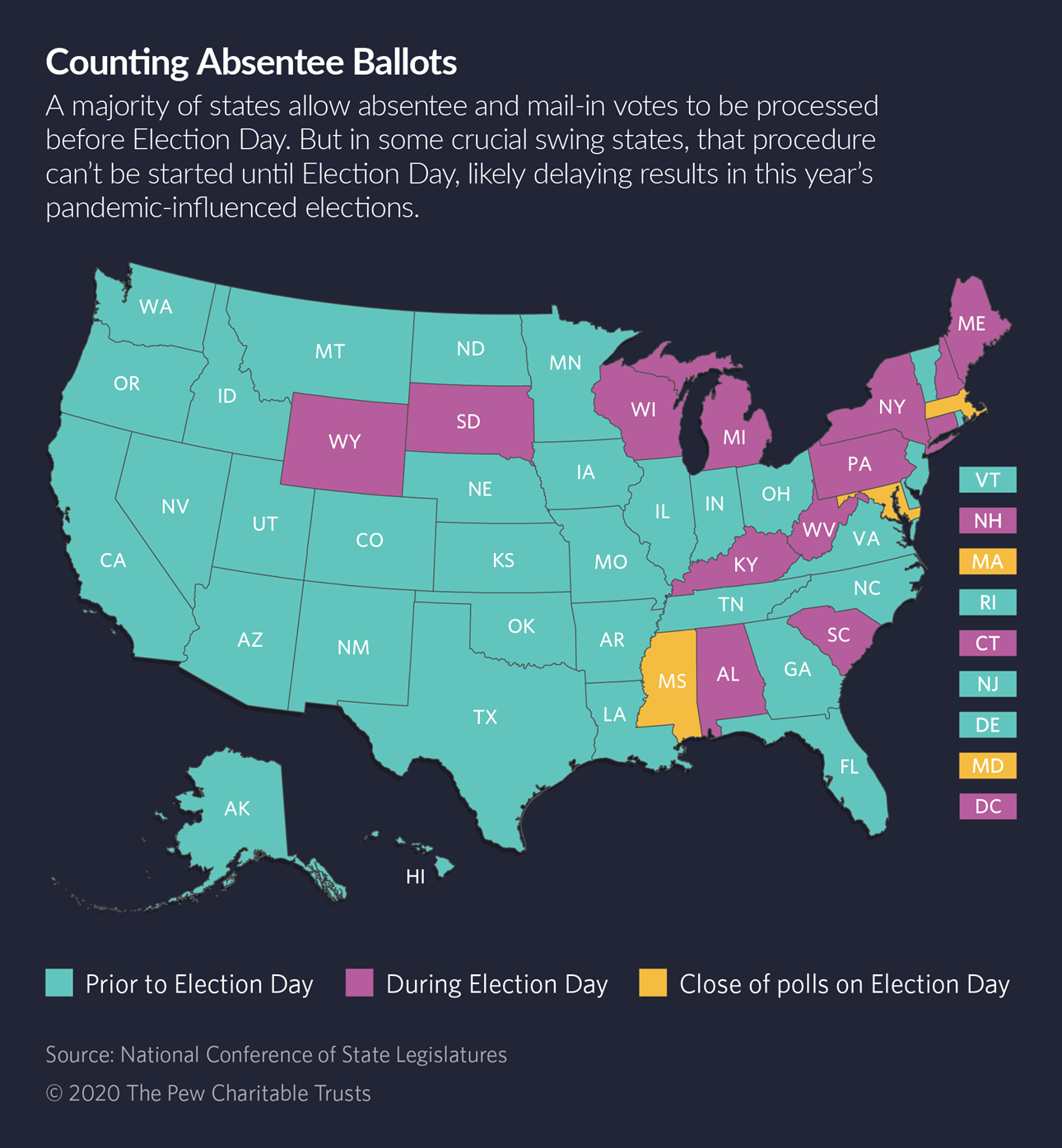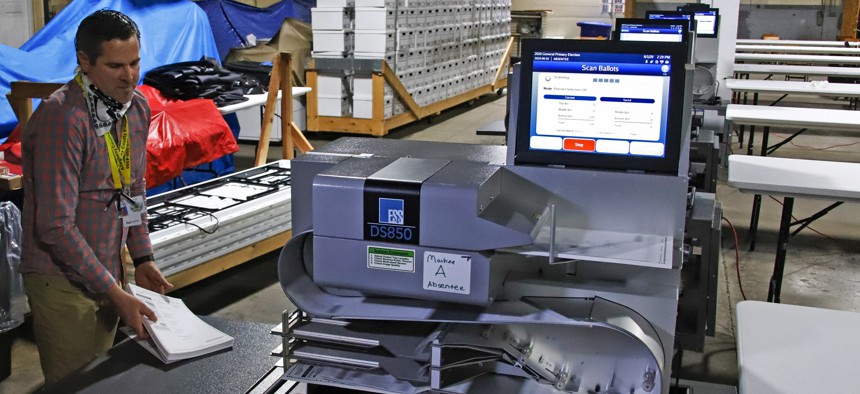Connecting state and local government leaders
Some states, including Michigan and Pennsylvania, prohibit processing absentee ballots until Election Day. Right now, leaders are considering changing that to avoid long delays about the results of the November election.
The cumbersome and sometimes slow counting of an expected record number of mail-in ballots—especially in some crucial swing states—could delay results and open the door to challenges in this year’s elections.
In 13 states and the District of Columbia, including the closely contested battlegrounds of Pennsylvania and Michigan, election officials can’t start processing absentee ballots until Election Day, and in three more states they can’t start until the polls close. With millions of such ballots anticipated, that’s a daunting, if not impossible, task to perform quickly.
And with many more voters using mail-in ballots for the first time, mistakes such as failing to sign the envelope or sending it too late likely will lead to a larger share of rejected ballots.
The possible result: vote counts that aren’t complete for days or even weeks, creating an opportunity for candidates, parties, members of the media or others to sow doubts about the legitimacy of the process.
Election officials and lawmakers in some states, including Michigan and Pennsylvania, are trying to alter counting procedures to avoid that outcome. But time is running short to alter the rules, and changing election procedures on the fly may create confusion.
Some states already have updated their laws this year to permit tabulation before polls close on Election Day, according to the National Conference of State Legislatures (NSCL). Delaware enacted legislation allowing tabulation to begin on the 30th of the month preceding the election through Election Day, but only for 2020. Louisiana enacted a law allowing parishes with more than 1,000 voters to process absentee ballots the day before Election Day and tabulate ballots on Election Day before polls close.
County commissioners in Pennsylvania, which doesn’t allow processing of absentee ballots until Election Day, are pushing the legislature to set a 21-day “pre-canvass period” during which they could verify bar code and voter information on envelopes and remove and flatten the ballots.
“Opening all of them on Election Day while we are still trying to administer an in-person vote is challenging,” said Lisa Schaefer, executive director of the County Commissioners Association of Pennsylvania, which is leading the effort. “Only allowing us to begin that work on Election Day makes it very likely we will not have results available on election night.”
While absentee voting issues such as slow mail delivery and ballot security have received a great deal of attention, fewer people are aware of looming delays in vote counting, said Edward B. Foley, law professor and director of the election law program at Ohio State University.
“The counting issues tend to get pushed to the side,” Foley said. “That can be dangerous if the counting process becomes contested and you haven’t addressed it.”
For example, Foley in his 2019 paper “Preparing for a Disputed Presidential Election: An Exercise in Election Risk Assessment and Management,” outlined a scenario in which President Donald Trump seems to have won in battleground Pennsylvania, only to have the slowly counted absentee and provisional ballots flip the outcome. In an extreme case, he said, the state legislature could try to appoint electors to the Electoral College, which selects the president, instead of relying on the popular vote.
“The basic issue is whether or not there could be a political climate developing that could cause the state legislature to distrust the popular vote to repudiate it,” Foley said, recalling the 2000 presidential election dispute in Florida, in which the U.S. Supreme Court eventually declared George W. Bush the winner. “[Democratic candidate Al] Gore ultimately accepted the Supreme Court decision,” Foley said. “He didn’t have to.”
Pushing For Change
Thirty-four states allow election officials to begin “processing” absentee ballots prior to Election Day, according to NCSL. While that means different things in different states, it generally includes opening the outer envelopes, verifying signatures and scanning bar codes. Some states allow removal of the ballots from the inner envelopes and preparation for counting (smoothing ballots and arranging them face up for feeding into counting machines).
On the opposite end, Massachusetts, Maryland and Mississippi don’t allow the processing to begin until the polls close.

In Pennsylvania, state Sen. Judith Schwank, a Democrat who spearheaded a previous move in Pennsylvania for mail-in voting without an excuse, says the legislature should move on pre-canvassing as well.
“I’m worried that so much doubt has been cast in the public’s mind,” she said in a phone interview. “It will work, it can work, it’s just that counting can take a long time. I’m on the ballot too, but I’m not so worried about my election—that will probably be resolved within a week. But the president … it’s a threat to democracy.”
Pennsylvania state Sen. Steve Santarsiero, a Democrat, is gathering cosponsors for a bill to allow a 21-day pre-canvassing period. In his letter urging his peers to sign on, Santarsiero said “counties have struggled to process and tally ballots in a timely way.”
He noted that by June 9, the date of the letter, a number of counties still had not completed the count from the June 2 primary in which 1.8 million Pennsylvanians requested ballots. It took almost two weeks for Pennsylvania to count all the primary ballots.
In a phone interview, Santarsiero said it would not surprise him if the general election took even longer to count. He suggested this was not a partisan issue. “I can’t understand how anyone could come to the conclusion that this is advantaging one side or the other.”
But Pennsylvania’s Republicans don’t seem enthused.
GOP legislators believe the plan “is politically motivated, wrong for Pennsylvania and would severely harm and compromise the integrity of our elections,” Jason Gottesman, press secretary to Pennsylvania House Republican Caucus, said in an emailed statement.
“The House Republican Caucus will continue to work closely with the Senate to develop a final product that provides clarity for voters, defends the Constitution, ensures the security of our election process, and protects election integrity.”
In New York, it took six weeks after the June 23 primary to count absentee ballots in U.S. Rep. Carolyn Maloney’s Democratic primary contest due to a court fight.
In Michigan, another key swing state, Secretary of State Jocelyn Benson also is calling on the state legislature to allow pre-canvassing of ballots. In an email to Stateline, her spokesperson Tracy Wimmer said the state has expanded the ability to process ballots, including additional tabulators and election workers.
“Even with this work, the biggest hurdle remains the law barring clerks from processing ballots ahead of Election Day,” she said. “With a record-breaking number of ballots cast in our statewide primary Aug. 4 and more than 1.8 million ballots already requested for November, it will be extremely difficult for clerks to process and tabulate all those votes in the same time frame we normally see results.”
State Sen. Ruth Johnson, a Republican and a former Michigan secretary of state, has introduced legislation that passed the Senate but has not yet been taken up in the House to allow for the pre-canvassing of ballots.
“People need to know at the end of the day, win or lose, get over it,” she said in a phone interview. “I don’t think voters want to be in limbo for weeks about who won.” She said the state estimates it might get 3 million absentee ballots, nearly double the 1.6 cast in the August primary.
Delays in Knowing Who Won
Wendy Underhill, NCSL’s director of elections and redistricting, said she wants to make sure that the public, the media and the candidates themselves understand that results in the year of Covid-19 might not be available as quickly as in the past.
“What keeps me up at night,” she said in a phone interview, “is that reporters want to know why they can’t have results on election night. The candidates too.”
In the past, Underhill said, there’s been no difference in the percentage of votes cast by Republicans and Democrats on Election Day versus those mailed in.
“If there should be a partisan difference in who is casting on Election Day and who is casting ballots by mail, it just doesn’t look right,” she said. “Up until now there hasn’t been a significant difference. Will that be the same this year?”
More than 550,000 absentee ballots were rejected in this year’s presidential primaries, far more than the 318,728 rejected in the 2016 general election, NPR found. With many more voters expected to vote absentee this year, many for the first time, that number is expected to rise, NPR said.
The kinds of mistakes on absentee ballots that lead to their rejection are the ones made by more first-time absentee voters, the analysis said, including failing to sign the envelope or sending it in too late to be counted under a state’s rules.
All of this means a close election may not be decided until weeks after election night, and the projected “results” announced by media outlets, based on partial returns, may not be the final word.
“These are valid votes cast by eligible people,” said Justin Levitt, election law professor at Loyola Law School in California. “Ballots that come in later are counted later,” he said, and should not affect the public perception about the validity of the count.
“It’s like predicting the results of a sports contest based on the first three minutes of the game. Nobody screams ‘fraud’ when the results turn out differently at the end of the game than in the first three minutes.”
Elaine S. Povich covers consumer affairs for Stateline.

NEXT STORY: A New Era of Coronavirus Testing Is About to Begin



